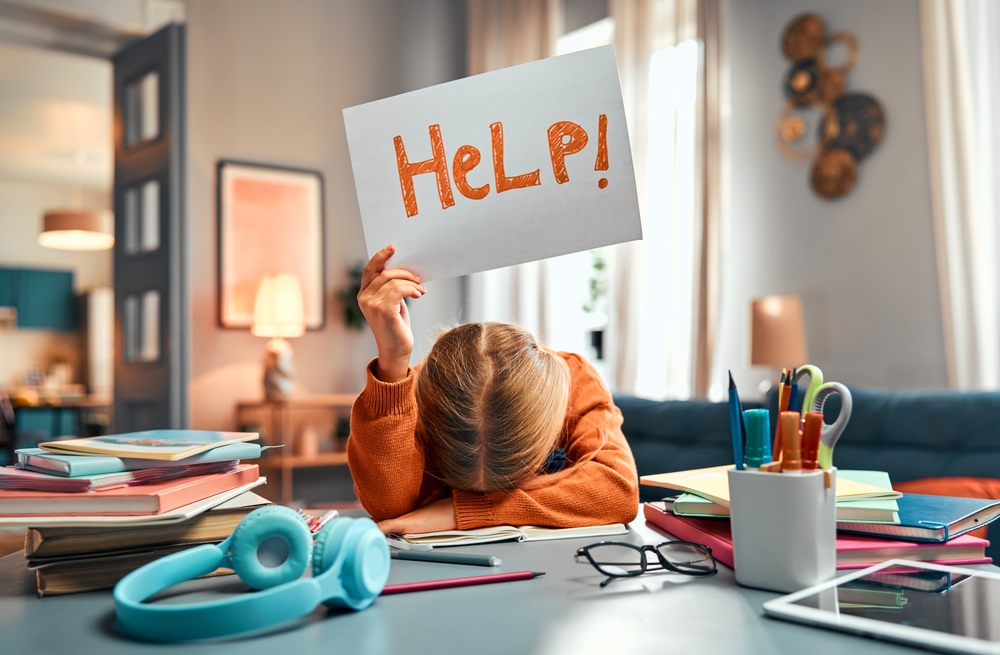Kids and teens are not immune to today’s life stresses. Children can face anxiety over everything from school projects to social relationships. Here is a parents’ guide to dealing with kids’ stress, so you can be prepared to respond when your children’s anxiety runs high.
Stress Isn’t Always a Bad Thing
Stress in small amounts, at the right time, is actually a good thing. Kids and teens experience stress when they are trying to prepare for, adapt to, or guard against something going on in their lives. It can motivate them to complete tasks and make positive changes. For example, the stress a high schooler faces in the week before finals could motivate them to study harder and take the test more seriously. Learning how to make good use of positive stress can build your child’s resilience, making them better prepared for the challenges of tomorrow.
Get help dealing with kids’ stress.
Talk to a psychotherapist today about how parents can help children cope with stress and anxiety.
Too Much Stress Can Be Harmful for Children
However, too much stress can be harmful to anyone’s physical or mental health. When kids’ stress or anxiety:
- Comes on suddenly
- Feels too intense
- Lasts too long
- Accumulates from too many sources
- Overwhelms a child’s supports, or
- Continues after the challenge is over
it may lead to future physical or mental health challenges. As a parent, your goal should be to monitor the type, number, and intensity of the stresses in your child’s life. You should be prepared to step in to provide support and help your children deal with the challenging life experiences they are facing.
7 Ways Parents Can Deal with Kids’ Stress
There are many techniques parents can use to help deal with kids’ stress. Often, you may need to use many of these strategies at once to provide your child with support to cope with and resolve the stressful situation and find peace.
Give Children a Safe Space
One of the best ways parents can help deal with kids’ stress is by making their home feel safe, stable, and secure. Do what you can to remove stressors from the home environment. Provide routines for things like bedtime, mealtime, school prep, homework, and family time. This can provide a rhythm and structure to your children’s days that can combat the chaotic feelings that come with stress.
Being a safe person to talk to – without fear of discipline or disapproval – is also important. Your kids should know they can come to you with anything, even if they don’t feel good about it, and be able to trust that you will help them through whatever they are facing.
Model Strong Coping Techniques
Kids and teens are still learning how to handle stress and hard life experiences. They should be able to look to you for positive examples for how to cope with stress. Modeling and teaching your children coping techniques like breathing exercises, journaling, and physical exercise to use when stress is high can be key to them developing healthy habits they will carry with them into adulthood.
If you struggle with stress yourself, be mindful of what your children see when you are stressed. Develop your own strategies to reduce harmful behaviors, and develop better habits to deal with stressful situations. Your children can learn from that growth, even if you aren’t perfect in your execution.
Help Prepare for Future Stressful Events
As an adult, you are better than your children at anticipating stressful events in the future. After all, these are some of the last areas of the brain to develop! That means you may be aware of a stressful event, like a test, concert, or sports tournament, before your kids even start to feel anxiety. Help them plan for these events ahead of time. Involve them in the planning process and talk through things they can do at school or outside the home to manage stress when it arises.
Build in Time to Rest
Stress can pile up as a result of too many obligations, deadlines, or responsibilities. As a parent, you need to make sure your child has time to rest to deal with their stress and reset their bodies and minds. Make sure you aren’t over-scheduling your children, so they have time to rest. The best rest activities are fun and creative, like painting, dancing, or reading, because they can inspire as well as offering an escape from your kids’ problems.
Create Positive Memories
When a child experiences too much stress, it can cause them to focus on negative thoughts and events more than they should. As a parent, if you believe your child is stressed, find ways to help them create positive memories. This might be a family day trip, or a special time with friends. It could be supporting a personal hobby or encouraging them to try something new. The goal should be to build positive emotions to offset the negative feelings caused by stress.
Advocate For Your Child
Sometimes kids face stress from adverse childhood experiences (ACEs) like bullying, harassment, or disasters. ACEs can negatively affect your child’s development and have lasting impact on their mental health. If you think your child is experiencing trauma, you need to become their advocate. They need an adult to stand up for them and make sure the appropriate authorities protect them from future abuse or harm. This can be hard, even for parents, but it is even harder for children who often feel like they don’t have a way to stop what is happening around them.
Get Help from a Counselor or Psychotherapist
When kids’ stress gets out of hand, it can be too much for parents to handle alone. That’s okay. If you believe your child is experiencing intense stress or having trouble coping, consider bringing them to a psychotherapist. There, they can learn and practice coping mechanisms, and find a safe person to talk to outside the family dynamic. By working with a psychotherapist as a child or teen, your kids will learn techniques to better handle stress in their day-to-day lives for years to come.
David Stanislaw is a psychotherapist with over 30 years of experience. He helps children, teens and adults identify and address stress, anxiety, and other psychiatric issues. Contact David Stanislaw to get help for your teen today.


 Common Treatments for Depression
Common Treatments for Depression Are Childhood Family Patterns Affecting Your Marriage?
Are Childhood Family Patterns Affecting Your Marriage? 7 Ways Therapy Can Make You a Better Parent
7 Ways Therapy Can Make You a Better Parent